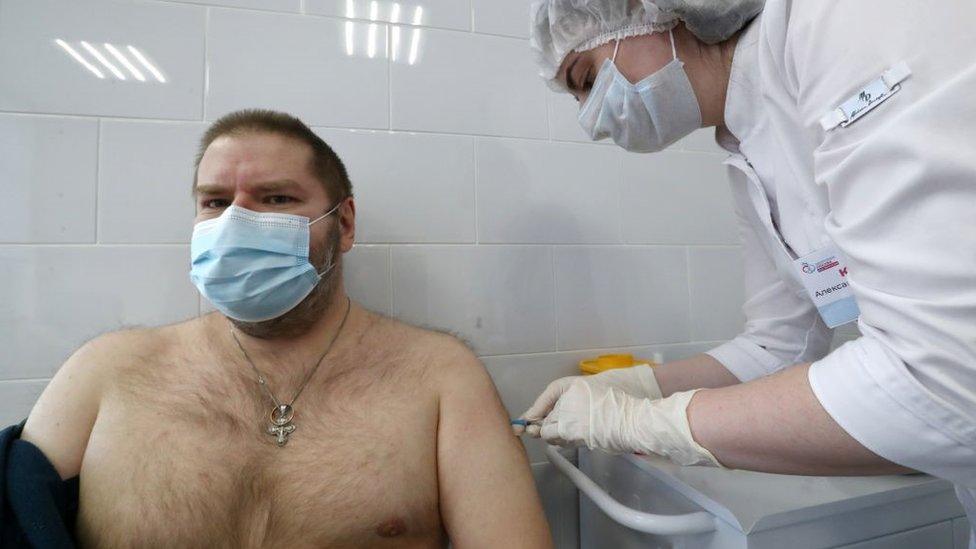Covid: Record deaths in Germany and Russia
- Published

German officials had hoped to relax "partial lockdown" conditions but are now planning to tighten them
Germany is facing calls for a second lockdown before Christmas after recording 585 deaths and 29,875 new infections in one day - the highest numbers since the pandemic began.
"We have to act urgently. We have to do more than was previously planned," warned Economy Minister Peter Altmaier.
Russia and Ukraine also reported record numbers of fatalities on Friday.
However, the latest excess death statistics have cast doubt on the numbers announced in Russian updates.
Germany has been under partial lockdown since early November, shutting bars, restaurants and entertainment venues, and a relaxation had been planned over Christmas.
But the rise in infections has increasingly alarmed top officials, with Lothar Wieler, head of Germany's public healthy body, the Robert Koch Institute (RKI), describing the situation as "extremely fragile". Chancellor Angela Merkel made an impassioned speech in the Bundestag (parliament) this week calling for tighter measures, saying that "500 deaths a day is unacceptable".


On Friday, Interior Minister Horst Seehofer warned that the only chance of regaining control was an immediate lockdown. "If we wait until Christmas, we'll have to struggle with high numbers for months," he told the Spiegel website.
Bavaria, in the south, has already imposed tighter measures and Mrs Merkel is reportedly set to meet all 16 state leaders on Sunday.

Germans wake up to pandemic peak

There are few joyful tidings for Germany this Christmas.
The country, which so successfully brought the first wave of the pandemic under control, is struggling to contain the second.
Today Germans woke up to two miserable new records. The highest daily number of infections and deaths in a 24-hour period.
A so-called "lockdown light", which includes the closure of bars, restaurants, leisure and arts facilities but is implemented to different degrees in different parts of the country, may have flattened the curve but it's done nothing to reduce the numbers.
The days when Germany's relatively low death toll was the envy of other countries are gone; it's rising fast and this week exceeded 20,000. So what's gone wrong?
Scientists say that Germans are simply not doing enough to reduce their social contacts. But many also point the finger at regional leaders, who for months have dithered, bickered and resisted Angela Merkel's calls for a tougher, countrywide response to the outbreak.

Elsewhere in Europe:
Ukraine has recorded a record 285 deaths
A Dutch judge has thrown out a challenge by firework sellers that bans them from selling fireworks for New Year's Eve. Anyone lighting a firework faces a fine of at least €100 (£90)
Shopping centres, restaurants and bars in Cyprus have closed their doors until 31 December to curb the spread
Czech officials say the pandemic is now accelerating and they will meet on Monday to discuss a response
What's happening in Russia?
Russia's pandemic task force says 613 deaths were recorded in the past 24 hours, bringing the total since the pandemic began to 45,893. Moscow and St Petersburg were worst hit.
However, official data about "excess" deaths - those above expected levels - has called this total into question. There were nearly 50,000 more "excess" deaths in October 2020 than in the same month last year.
In December the BBC's Sarah Rainsford went to a Moscow clinic where the Sputnik V vaccine was being given to patients
Statistics service Rosstat said 22,761 of the October deaths were either confirmed or suspected Covid cases.


Official health figures were less than a third of that, but only count deaths listed by a post mortem examination as having coronavirus as the main cause.
Russia began using its Sputnik V vaccine on doctors, teachers and social workers last weekend and claims that some countries have been resorting to "not very pleasant" methods to discredit it. In a boost for Sputnik's producers, UK and Russian scientists are to trial a combination of the Oxford-AstraZeneca and Sputnik V vaccines to see if protection against Covid-19 can be improved.
Sputnik's backers claim it offers 95% protection against the coronavirus, but data released so far is based on interim results only. Russia previously mocked the AstraZeneca jab as a "monkey vaccine" - referring to its use of a modified common cold virus that infected chimpanzees, rather than one that affects humans, to elicit an immune response.
Related topics
- Published8 December 2020
